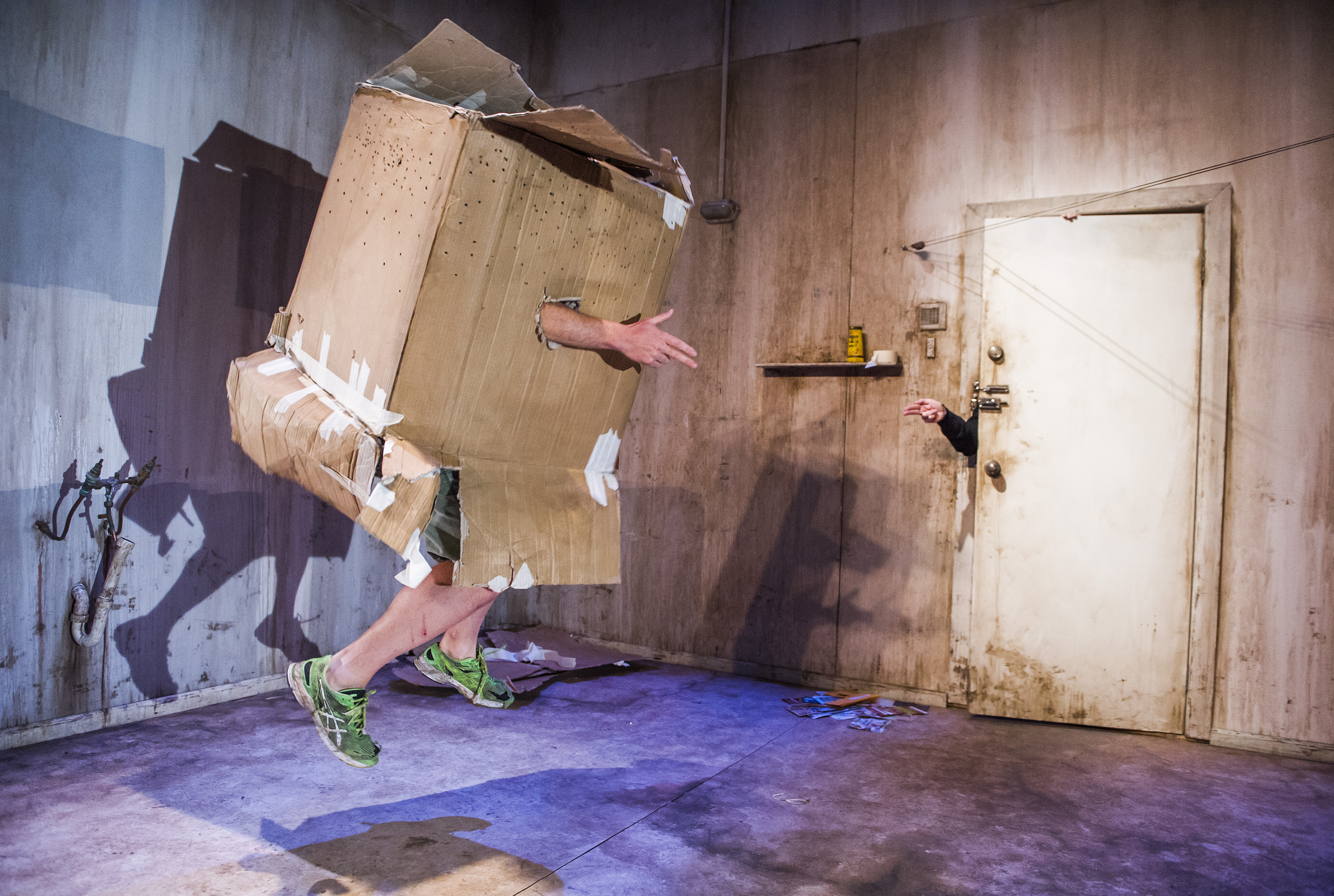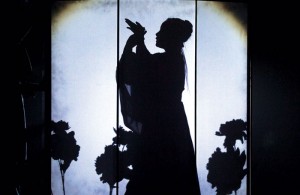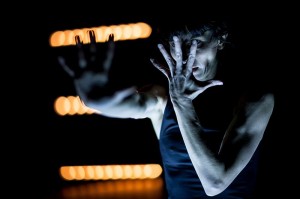Give Me Your Love. Give Me Your Love. GIVE ME YOUR LOVE.
Yes, yes, yes – Ridiculusmus slay me with a beautifully written, gorgeously designed and staged, magnificently performed show that leaves me weeping.
There’s an elephant in the room here. Except it’s not an elephant, it’s a brown cardboard box stabbed with ragged holes. Skate around it, skirt around it, but there it is. There’s someone inside. Get out of the box, shouts a disembodied voice. You get out of whatever you’re in, comes the retort. Through the holes we see feet in scuzzy trainers. An eye staring warily at us. A male crotch in grubby cut-down shorts. A finger wriggling out, telling the story of a decapitation which may or may not be the root of the box-dweller’s trauma. A Beckettian mouth, agape, distraught. There are objects in the space. A roll of parcel tape. A piece of piping that falls to the ground when the door is rattled. Ah yes – the door. Locked, with a chain on. The disembodied voice is trying to get in, and when that fails, get something in – a tortuous process involving string, pulleys, and discarded junk mail envelopes. Like previous Ridiculusmus work, this is a piece in which words are important, but the words are embodied in extraordinary physical, visual, visceral performances. Totally total.
Give Me Your Love is the second in a trilogy the company (David Woods and Jon Haynes who write, devise, direct, perform) are making about innovative approaches to mental health. Here, the investigation is into the use of MDMA with sufferers of Post Traumatic Stress Disorder (the box dweller is a former soldier). The show, seen on this occasion at Summerhall, has been previously reviewed by Total Theatre Magazine at the Sick! festival in Brighton.
So that was a good start to my Ed Fringe 2017. On next to Pleasance Courtyard for two shows by ensemble physical theatre companies – old hands Gecko and relative newcomers Theatre Re.
Theatre Re’s offering, The Nature of Forgetting, gives us four performers who take the tag ‘physical theatre’ seriously. They run on the spot, they throw chairs between them, they cycle on bicycles fixed to the floor, they dance on tables. Is there a mime or physical theatre more that they have forgotten? I don’t think so. Photo freeze-frame moments, tick. Watching an imaginary film, tick. Rails of clothes whizzed on and off stage, tick. Funnily enough my favourite moments are the quietest ones, in which the lead character, a man called Tom with early onset dementia, sits in a chair on his 55th birthday, agonised by his lack of understanding as he tries to recall his daughter’s words about which jacket to wear: ‘Dad. Mike’s coming with Grandma. The blue jacket on the end of the rail. The red tie is in the pocket.’ As he tries and fails numerous times to locate the right jacket, or find the tie, or work out which arm goes into which sleeve, we watch in agony, silently willing him to succeed. These moments are proof that the best ‘physical theatre’ is actually about the calm control of the body rather than frenetic running about. The ensemble are also not helped by the two live musicians (drum kit and synthy keyboards) whose bombastic accompaniment often ruins tender moments. The show is very well received – full house, standing ovation – and I’m pleased to see this sort of classic Lecoq work appreciated at the Fringe. But to be honest, if you want to see a lyrical and whimsical show about memory and loss, I’d suggest booking yourself in to Theatre Ad Infinitum’s Translunar Paradise, which does the same thing a lot better.
Much of Theatre Re’s repertoire of physical moves brings early Gecko to mind – so it was interesting to move immediately on from The Nature of Forgetting to The Dreamer, Gecko’s collaboration with Shanghai Dramatic Arts Centre. The ante is upped. As we enter the space, we are confronted with an enormous set on two levels. Performers are running in and out of the auditorium, wearing flowing overcoats and with miner’s headtorches, chattering to each other or taking selfies on their phones. The following hour is a delightful deconstruction / reconstruction of A Midsummer Night’s Dream, with disappointed lover Helena cast as the central character, the object of her desire (Lysander) betrothed to her best friend Hermia. The show also references a Chines play I am not familiar with, The Peony Pavilion (by Tang Xianzu) about a woman who falls in love with her dreams. The ensemble work is excellent – precise, and to the point. Yes, it is all very typical of Gecko – the flocking and unflocking, the juxtaposed duets on different levels, the clever use of chairs and ladders, the disorienting tipping-up of pieces of staging and objects – but the Chinese performers give the vocabulary a new zest. The massive set – including a giant bed that whizzes on and screens used effectively for sections of shadow theatre – is used well, with interaction between human body and object always precisely executed, creating a a piece that is a great flow of beautiful visual images. My only reservation is the representation of Fairy Queen Titania’s foolish love Bottom – having set up a world in which the lovers (Helena et al, who play out their play centre-stage) are in modern-day Shanghai, and the fairies (on the top level or in the little stations below) are in other-worldly floaty costumes, Bottom arriving in traditional donkey-eared garb seems somehow odd. And is he even necessary dramaturgically in a version of the story that focuses on and recasts Helena as the lead? That aside – a good show, which manages to highlight contemporary issues for young Chinese women within a frame of reference accessible to audiences worldwide.
And now for something completely different, at the Assembly Roxy: Trygve versus a Baby, in which a world-famous mime artist (Trygve Wakenshaw) shares the spotlight with a baby. But not just any old baby: this is his 13-month-old son Phineas. As the audience arrives both are dressed in white romper suits – well, Trygve’s is actually a white shirt and ludicrously tight white spandex leggings but you get the idea – and both are rolling and romping on the stage. Although Phineas sometimes takes off in a run from one side of the stage to the other, which Trygve comments on, pointing out that the show is very different to how it was when they started two weeks ago – Phineas couldn’t run then. I suppose I’m expecting an hour of father-and-son improvisation, but no – this is a properly written and rehearsed sketch show, with walk-on (crawl-on, run-on) parts for Finius who arrives from the wings as the sun, as a matador, and as a boxer amongst other roles. When he comes in as a lion, with a little tail pinned to his bottom, Trygve holds at bay with a chair. It is all very cleverly orchestrated, with the tight structure allowing for the joys of in-the-moment improvisation, in the best clown and physical comedy tradition. It is extremely funny and heartwarming, but also an interesting reflection on how eager human beings are to perform. Perhaps there are off days, but on today’s showing Finius and Trygve both very clearly bask in the sunshine of attention and applause.
My final show of the day is at Zoo Southside – Spitfire’s The Narrator, a new show programmed alongside their award-winning One Step Before the Fall. Like its sister show, The Narrator features an intense physically challenging performance by one woman (Cecile de Costa) on stage and an offstage musician on numerous instruments, including drumkit. The relationship between them is excellent: a flamenco-style tattoo of the feet is picked up by the snare drum, and the mic’d up floor of the rather stunning set – a square stage surrounded by tanks of water, sand and gravel – picks up the sounds of her feet, feeding these sounds into the soundscape. The relationship between sound and physical action is as vital here as it is in One Step Before the Fall. There are many beautiful moments: feet scuffling on gravel, the whole body immersed under water, a dowsing in sand to become a woman of clay. And there is voice: beautiful song that sounds like a Gregorian chant; an intense poetic rant that brings Patti Smith to mind. There is also spoken text which is less successful. It may be a case of lost in translation, but the words are puzzling, making little sense (in the wrong sort of way). If I heard correctly, ’God is not the name of my three unborn children’ is a line repeated in many different parts of the show. The show purports to be about ‘secrets, about the unspeakable truth, about being a woman’ and although I love a fragmented narrative as much as the next person, and don’t need everything spelled out for me in a show, I nevertheless felt that I wanted just a little more inclusion into this story of – what? Miscarriage, perhaps? Despite that reservation, it is a powerful show delivered by two excellent performers, Spitfire proving again their prowess in the creation of intense, physically embodied performance work that goes straight to the guts.
Featured image (top of page):: Ridiculusmus: Give Me Your Love.
Full details of all shows, times and tickets prices/booking options at www.edfringe.com



